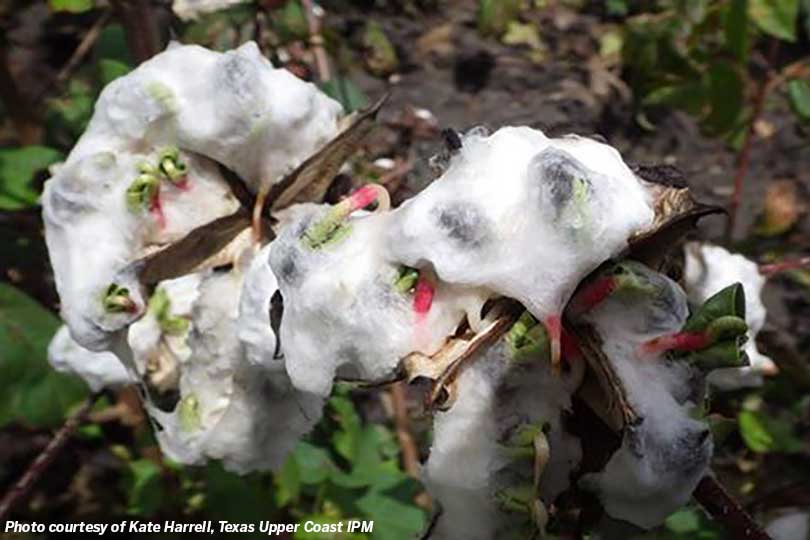By Jessica Domel
News Editor
There’s at least some good news for Texas cotton farmers impacted by large amounts of rain on open bolls. Gins may be able to salvage strung out, stained and sprouted cotton.
“They generally do a pretty good job of cleaning it up. I saw some hand samples or hand grab samples that were ginned the past few days that were sprouted. You couldn’t tell a difference in it and previously harvested cotton. That’s a good thing,” Dr. Shane McLellan, Texas A&M AgriLife Extension agent in McLennan County, said in an interview with the Texas Farm Bureau (TFB) Radio Network.
Although gins may be able to process the cotton, some farmers remain concerned with the impact it will have on quality.
“The biggest concern is the decrease in lint value. Cotton gins can get our cotton very clean. Ginners can still gin that sprouted cotton,” McLellan said.
Near Wharton County, farmers received between five and 11 inches of rain last week and over the weekend.
The cotton there has since dried out, and Kate Harrell, Extension Agent-Integrated Pest Management for Texas A&M AgriLife Extension in Wharton, says the seed coats are hardening.
She reports that, optimistically, the seed coats will be hard enough to roll the cotton lint off.
“We’ll be docked a little for lint quality,” Harrell said on the IPM Facebook page. “Either way, the farmers won’t be able to sell the cotton seed, which usually helps cover the ginning cost.”
Cotton pickers are running in Victoria County, although some fields remain too wet for harvest.
Xandra Morris, Extension Agent-Integrated Pest Management for Texas A&M AgriLife Extension in Hill County, said the cotton near Waco and Hillsboro may not face the fiber quality issues farmers first feared as long as fields dry out soon.
“As long as the sprouted and germinated seed dries down completely, there should be relatively few problems with ginning,” Morris said. “There will be some losses due to discoloration/color grade and some loss of seed value depending on the percent sprouted seed. However, fiber characteristics should remain unchanged unless we continue to get rain for a long time.”
There’s not much cotton farmers can do for their crop right now other than wait and hope fields dry out soon, according to McLellan.
“The biggest question that those farmers are having, especially with the low-yielding cotton fields, is if the value of that lint actually justifies harvesting or not,” McLellan said.
Harvest in the Waco area is likely to begin as soon as fields dry out.

